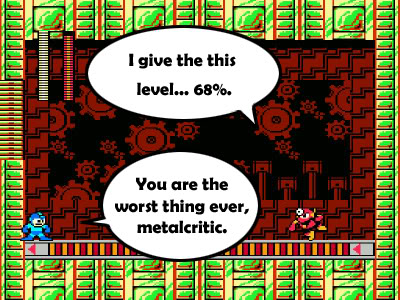
Game reviews are important. With the wealth of titles newly available every week, they are useful for producing educated consumers. The problem, however, is when we live by the numbers attached to the reviews. As our lives grow in complexity and our free time shrinks, we find ourselves having to make choices about what games we play. Unfortunately, it is becoming more and more common for scores to stop being a guide and start being the rule.
A trip to a video game store has drastically changed in the last decade. We walk through the door, head directly to the new release we came to purchase, pick it up, take it to the register, and leave. Using information gleaned from online research, we calculate what we want to buy before we even enter.
The last time I browsed the shelves of a game store was back in 2002. While wandering the aisles of a Hastings in a small college town, a game called Enclave caught my eye. On a whim, I grabbed the title and took it home, not expecting much from such a spontaneous purchase. After a few levels, however, I found that I loved it.
Enclave won me over with its numerous playable characters, fantastic graphics, and complex levels that hid treasures and replay value in every corner. It quickly became one of my favorite games of the last generation. It wasn't until months later that I found out that the game had a horribly mediocre accumulated-review score. Apparently, all the fun I had was an error on my part.

Our access to information on games has changed drastically. The only source of information on the next "must-buy" title used to be the school playground. One single voice was all it took to sell us on a game, and the more emotion in the voice, the quicker the sale. As the years progress, this light trickle of recommendations has become a torrential downpour of opinions.
It is very human of us to want to turn all this information into something we can easily digest, but by simplifying the review process, we have replaced the kid up the street with the mathematical formula used by sites like Metacritic. The days of passionate word-of-mouth reviews are over, and all we are left with is a cold, hard number.
"I will only play good games; ergo, I will only play games that receive above a 90-percent rating on Metacritic" seems like a pretty logical maxim, but the second rule neglects unique games that may appeal to an individual's specific sensibilities. This mentality mostly guarantees that whatever we do play will be of high quality, but it also makes us more prone to missing out on the fun that "lesser" titles may offer.
Some of my favorite games have been "bad" games. State of Emergency received lukewarm reviews, which makes me question why I'm the only one who enjoys fighting through crowds of looters and attacking people with trash cans, stolen TVs, and anything else I could get my hands on. Jericho had an unforgiving first level, but the rest of the game had all the twisted character design and fun gameplay that I could stomach. My biggest sin, however, is my love for Rise of the Argonauts. According to one score aggregator, it stands at a 54 percent. According to me, the game has an amazingly deep story, fantastically diverse locations, fun combat, and it does a great job of mixing fresh genres with traditional beat-em-up gameplay. All of these games may be "atrocious" on paper, but I will always save a special place for them in my heart.
On a purely selfish level, "bad" games have benefited me by giving me hours of entertainment, but I also have to respect them for their contributions to the evolution of the industry on a whole. Starbreeze was able to hone their design skills to perfection with Enclave; they then used that experience to create the critical darling The Chronicles of Riddick.

State of Emergency had a unique blend of a mall environment, hundreds of characters, and tons of improvised weapons, and it's very possible that these features helped inspire games like Dead Rising. We have yet to see how Jericho and Rise of the Argonauts will subtly influence the industry, but anyone who played them is sure to find their horrific character design and their ability to blend role-playing into a brawler inspirational. Subconsciously, developers have learned from the thousands of successes and failures in each of these titles, and the industry as a whole is better for it.
Video games are an art form, which in turn makes them difficult to evaluate. Publishers release a lot of irredeemably awful games, but when we classify something as " bad" through an either-or process, we may bury a genuinely fun experience beneath a low number.
When you are considering buying a new game, avoid basing your purchase choice solely on a heartless number, and be sure to read the full story or talk to a friend. Find a review voice you can trust, and let them steer you to games you may have avoided otherwise. Dare to dip below an arbitrary 75-percent cutoff point. Finally, every once in a while, buy an old, cheap game on an uneducated whim. Who knows? Maybe you'll discover a hidden gem that feels custom made just for you.



